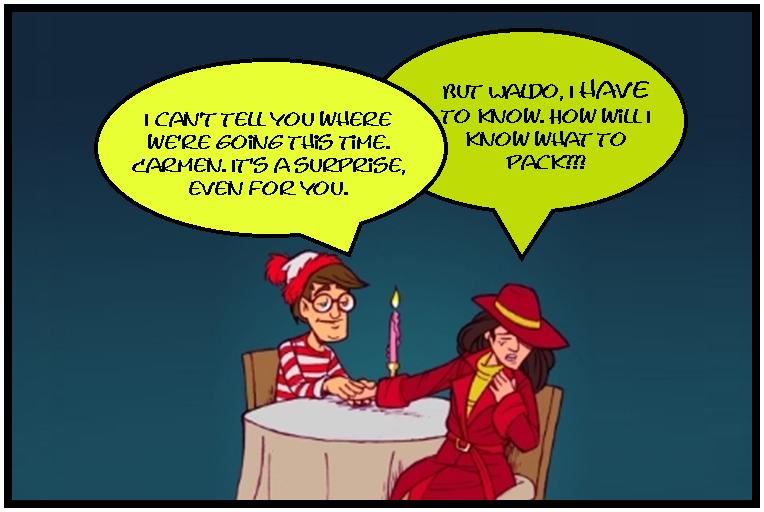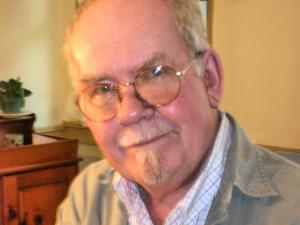Monday, June 6: The Scribbler
WEEKDAY UPDATE
by James Lincoln Warren
In the last few months, I’ve promised to keep the Gentle Reader informed regarding my progress in a few ventures, not because I think that any of you are particularly obsessed with my life, but because the progress of those ventures may be of some small assistance to others contemplating the same sorts of things.
I’m reminded of one of my favorite scenes in the film version of From Russia with Love: Bond has just trussed up Benz (Peter Bayliss), a Bulgarian agent, in a train compartment on the Orient Express and left him under the watchful eye of Kerim Bey (Pedro Armendáriz), the British Secret Service’s man in Istanbul. The Bulgarian sits on the floor, bound and gagged, his eyes wide with apprehension.
Lighting up a cigar, Kerim Bey says, “I’ve had a particularly fascinating life. Would you like to hear about it?”
Benz grunts, obviously unwilling to be forced to listen to Kerim Bey brag, to which Kerim Bey replies with delight, “You would?”
The Kid of Kindle
Yesterday, Leigh asked me how my “experiment” in selling my short stories as Kindle downloads was going. My reply was, “I wouldn’t call it an experiment. I would call it putting my short stories up on Amazon for sale as Kindle downloadables. There have been a few sales but not many.”
But it was a fair question. As far as I can tell, only three of my stories have been sold, and then only once each, and two of them to the same person. Today I put up another, “Shanghaied”, which the Gentle Reader may recall was selected by Otto Penzler as one of the “Other Distinguished Mystery Stories of 2009” in The Best American Mystery Stories 2010, which he co-edited with Lee Child. At Otto’s famous post-Edgar party this year, he told me again how much he had loved that story and that if it had been strictly up to him, it would have made the cut into the anthology. I thought that was very gracious of Otto.
I thought that perhaps the burgeoning market in eReaders might be a windfall for us writers of short fiction. My unspectacular success thus far should not be taken as evidence that I was wrong. In the first place, I haven’t yet bothered to format my stories for any other platform than Amazon’s Kindle, and I think that’s a necessary step. In the second place, and far more importantly, I have done exactly nothing in the arena of marketing the Kindle versions except mention that they were available during my panel at Malice Domestic this year and mention it here on Criminal Brief—but that panel wasn’t about me at all, because I was the moderator, and bringing up the matter on CB is truly preaching to the choir. So obviously, I need some sort of publicity plan.
If that fails, assuming I get around to it, it still doesn’t mean that I’m wrong about the future of short stories on eReaders. It only will mean that people aren’t that interested in my short stories.
Black Orchid
Last November, I told the Gentle Reader that I was embarking on an entry for the Black Orchid Novella Award competition in a column titled “The International Herald-Tribute”. I hinted that I was working on a female version of Nero Wolfe set in Los Angeles. Now, this idea was hardly original with me: our own Melodie Johnson Howe wrote two novels based on the exact same premise, The Mother Shadow and Beauty Dies, featuring Claire Conrad (Wolfe) and Maggie Hill (Archie), the former of which books was nominated for an Edgar. But I was confident enough that our styles and brains were significantly different enough that my story wouldn’t come across as imitating Melodie’s.
Well, I was right about that, but not necessarily in a good way. I found I had real trouble finding my Archie-substitute’s voice, especially because she was young and female and I’m middle-aged and male. I wrote about those struggles in a column called “Hearing Voices”. Several months later, after consulting both Melodie and my friend Nora McFarland on finding my inner girl, I had something of a breakthrough, which I described in “Little Things”.
It still took me a good while to finish the story, but a couple weeks before the submission deadline, it was in good enough shape to send to readers for vetting. This is my custom: I do not belong to a writers’ group, but when I’ve got something close enough to the finish line, I will send it to several readers whose opinions I respect for feedback. For me the key is if any two of the vetting readers point out the same thing wrong, but I also find that I get excellent advice on things I may have missed or miscalculated.
So I sent the completed draft to Rob, Steve, Melodie, John, and Nora. Interestingly, to me at at least, none of them had the same criticisms and all of them offered one or more subtle means to improve the story (except for Melodie, who had already given me some invaluable advice). (The not-so-subtle ones I really did not have time or space to address, alas.) After getting their comments and making whatever changes were needed, I then showed the typescript to my wife Margaret, who is at once my best and most thorough critic. When all she did was change one sentence and correct a few typos, I knew the story was ready and off it went in the mail.
The most gratifying thing to me is that all three women who read the story gave their stamp of approval to Erica, my female Archie Goodwin character, and every one of them told me how appealing they found her. Music to my masculine ears.
L.A. Noire
A couple weeks ago, I wrote about the video game “L.A. Noire”, which occasioned my purchase of a Sony PlayStation 3 console.
Margaret and I played the game together, taking turns with the controller. I am pleased to announce that my driving and marksmanship have improved dramatically, although I’m still nowhere near on par with my nephews.
We have finished playing the game, but not playing with the game. The gameplay is divided into five stages: Patrol, Traffic, Homicide, Vice, and Arson. After you complete each stage, there is a feature called the “Cases” menu, which allows you to revisit particular game scenarios, accessible in folders respectively labelled to each stage. After you have finished the entire game, though, a new scenario is added to each one of the folders: “The Streets of L.A. (Free Roam)”, which enables you to drive around and do all the extras without worrying about the plot. This includes answering emergency dispatch calls, finding rare automobiles to drive around in (and some of these are ultra-cool, especially to people like me who really love old cars like Cords and Deusenbergs and the like), and collecting golden movie reels. So we probably have several weeks of fun to go.
But a word about the game’s plot: it’s very well done, and culminates in a perfect ending that is completely true to the genre.
And that’s all the news from the desert to the sea to all of Southern California (that being the famous opening line of the late Los Angeles pioneer TV anchorman, Jerry Dunphy.)


































